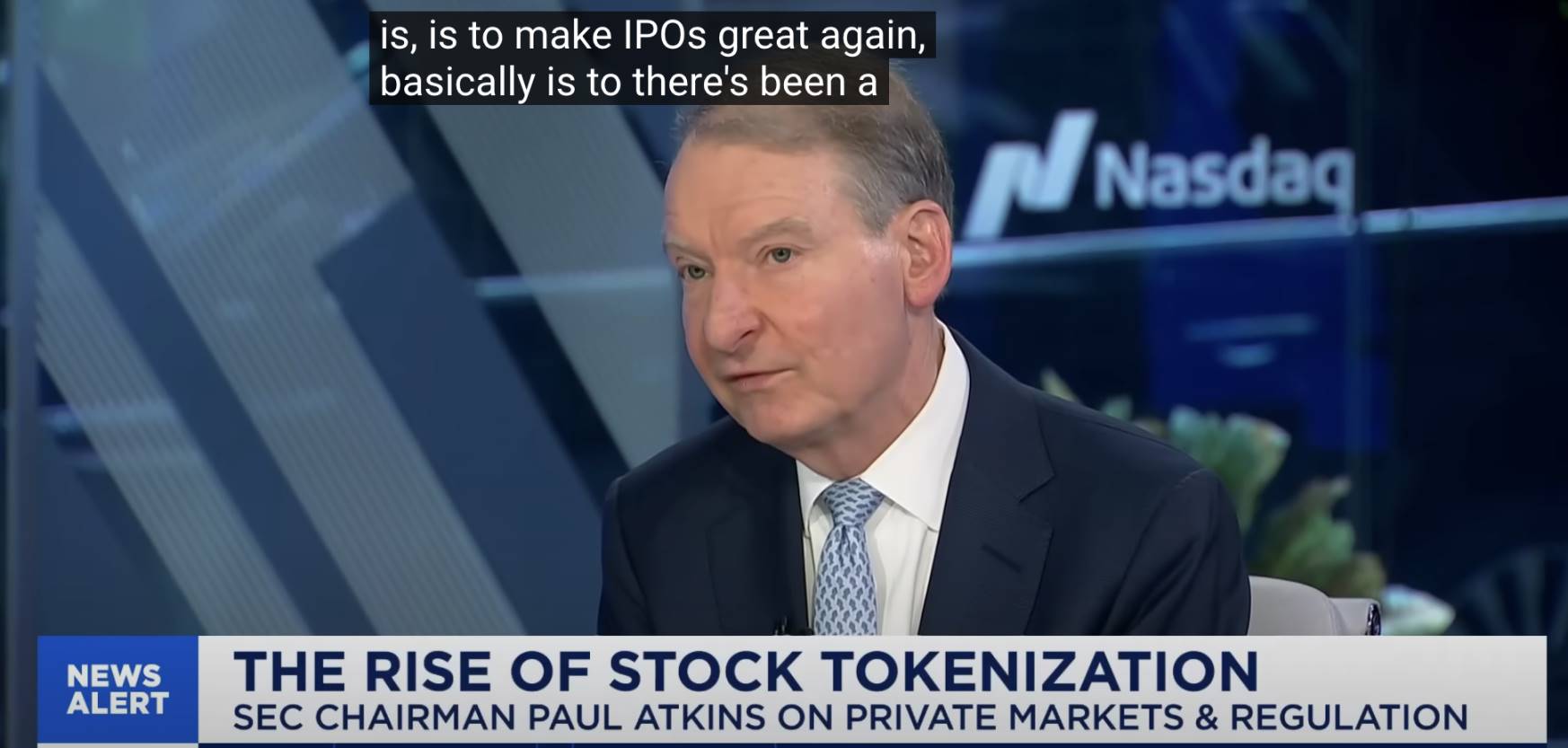Ten years ago, we missed the opportunity of stablecoins; will we miss the tokenization of stocks ten years later?
Written by: Zhou Zhou, Foresight News

As the wave of stock tokenization sweeps across the globe, Hong Kong chooses to remain silent.
"In the short term, no company will attempt stock tokenization in Hong Kong," executives from three Hong Kong crypto companies revealed to me.
Ten years ago, Hong Kong missed the best opportunity to develop stablecoins in Hong Kong dollars and renminbi, significantly lagging behind US dollar stablecoins (annual trading volume of $28 trillion) and euro stablecoins (annual trading volume of $2 trillion). Now, as the market for "stock tokenization" is burgeoning, Hong Kong still chooses to miss out.
At the beginning of July 2025, US regulators and corporate giants ignited an innovative wave of "US stock tokenization." Robinhood and Kraken officially announced the launch of their US stock tokenization products, allowing ordinary users to buy US stocks like Tesla and Apple on the blockchain without permission. Robinhood even launched tokenized stocks for private companies like SpaceX and OpenAI, sparking market discussions. Paul Atkins, chairman of the US Securities and Exchange Commission (SEC), even recently appeared on CNBC to express his support for stock tokenization technology.

However, on the other side of the ocean, Hong Kong's crypto companies appear to be quiet.
I reached out to practitioners from three compliant crypto companies in Hong Kong, including HashKey and OSL, and learned that while they are actively monitoring the situation, they have not actually participated in the exploration of stock tokenization business.
Faced with this early-stage market that has the potential to become the next trillion-dollar market after stablecoins, Hong Kong seems to have chosen to forgo the attempt. Even as the trials of US stock tokenization are in full swing, and even though this could be a trillion-dollar market.
Some practitioners can't help but ask: Why has Hong Kong, which has strongly supported the development of cryptocurrencies over the past three years, chosen silence this time?
Why is Hong Kong silent?
Ten years ago, we missed stablecoins; ten years later, we are set to miss stock tokenization. Why is Hong Kong, which supports ETFs, RWA, and stablecoins, hesitant only on stock tokenization?
An executive from a Hong Kong crypto company told me that some forward-thinking practitioners in the Hong Kong crypto industry had actually been actively promoting stock tokenization in Hong Kong for quite some time.
"Two years ago, Xiao Feng (founder of HashKey) was actively pushing the Hong Kong government to experiment with stock tokenization, and many industry executives were also actively promoting it, but it didn't work out."
In Hong Kong, the law clearly states that only exchanges recognized by the Hong Kong Securities and Futures Commission can legally operate stock trading markets, which grants the Hong Kong Stock Exchange a "monopoly position" in stock trading. If stock tokenization were to be trialed, it would inevitably break the long-standing monopoly position of the Hong Kong Stock Exchange.
"The Hong Kong Stock Exchange has a monopoly on Hong Kong stocks; no one wants to take the first step to break that monopoly and become a sinner in the history of the Hong Kong Stock Exchange."
"If you were the Hong Kong Stock Exchange, would you revolutionize yourself?" the executive asked.
The resistance is significant, and the Hong Kong regulators and the Stock Exchange itself lack sufficient motivation and incentive to promote stock tokenization, which may be the reason for Hong Kong's silence this time.
The situation in the US, however, is different from that in Hong Kong. Since Trump took office, the current US regulatory agencies have been very supportive of cryptocurrency innovation. Whether it is US dollar stablecoins or stock tokenization, both are aimed at enhancing the status of the US dollar and US stocks, allowing global users to bypass regulations and conveniently purchase US assets.
The financial innovation ecosystem in the US is also more vibrant and robust. Whether it is Robinhood, the largest online brokerage in the US, Coinbase, the largest cryptocurrency exchange in the US, or Solana, the largest public blockchain in the US, they all see themselves as challengers to the traditional financial world, with some even targeting Nasdaq directly. They have successfully pushed for regulatory relaxation regarding stock tokenization.
This is also a distinguishing feature of this round of stock tokenization compared to the previous round.
An insider from Bybit pointed out: In the previous market cycle, there were indeed some early attempts, such as the tokenized stock projects launched by Mirror Protocol and FTX; however, they mostly faced issues like unclear regulations, lack of sustained liquidity, and weak interoperability with other DeFi protocols. Additionally, the failure to establish solid partnerships with compliant custodians or infrastructure providers exacerbated the failure of these projects.
"Early setbacks should not hinder innovation in this field. With technological advancements, clearer regulations, and enhanced infrastructure, tokenized stocks still have the potential to play a key role in the next round of financial transformation," said the Bybit insider.
It is worth noting that the participants in this round of stock tokenization not only include powerful compliant institutions like Robinhood, Coinbase, and Kraken, but also experienced cryptocurrency exchanges like Bybit, Crypto.com, and Gate that have been navigating the crypto market for years.
Unfortunately, among the many participants, we may not see the presence of Hong Kong crypto companies. The excitement of stock tokenization is destined to be unrelated to Hong Kong in the short term.
Stock tokenization has the potential to become a trillion-dollar market
Ten years ago, China missed the best opportunity to develop renminbi stablecoins; ten years later, Hong Kong will miss stock tokenization. Perhaps in ten years, people will lament why they did not develop renminbi stablecoins just as they do now about the lack of development in tokenized Hong Kong stocks.
Ten years ago, people abandoned the exploration of renminbi stablecoins, leading to the emergence of US dollar stablecoins with a market value of hundreds of billions and a market size of trillions. In 2024, the annual trading volume of US dollar stablecoins reached $28 trillion, even surpassing the combined total of Visa and Mastercard.
Stock tokenization is the next important mass adoption track after stablecoins, and the next potential trillion-dollar market; this judgment is not unfounded. Many industry insiders believe that the tokenized equity market "can reach a scale of several trillion dollars."
Data shows: By 2025, the market value of US stocks will reach $5.2 trillion, while the circulating US dollars amount to only $20 trillion. From the perspective of overall market size, the market for US stock tokenization is broader than that for US dollar tokenization. Currently, the market value of US dollar stablecoins (US dollar tokenization) has reached hundreds of billions, while the market value of US stock tokenization is only tens of millions, less than one ten-thousandth of the former.
In addition to market size, global users have a strong demand for US stock tokenization, just as they do for US dollar tokenization. Currently, regions like Europe and China restrict people's freedom to purchase US stocks due to regulatory reasons. However, US stock tokenization, being issued on public blockchains, naturally bypasses regulations, allowing all users to purchase freely.
Moreover, US stock tokenization can achieve things that the US stock market cannot.
Andy from HashKey Tokenization believes that tokenized stocks have more advantages than traditional stocks.
"For example, users can achieve 24/7 spot trading; users can engage in 24/7 on-chain derivatives trading; users can tokenize stocks of private companies, allowing ordinary users to purchase equity in companies like OpenAI, SpaceX, ByteDance, and Ant Group before they go public; users from countries around the world, including Europe and China, can bypass regulations to buy US stocks, just like they do with US dollar stablecoins," Andy said.
Currently, not only are compliant exchanges like Kraken, Robinhood, and Coinbase exploring US stock tokenization, but exchanges like Bybit, Crypto.com, and Gate have also launched corresponding US stock tokenization products, and the trend of US stock tokenization is gradually taking shape.
In conclusion
Although the current market size of US stock tokenization is only tens of millions, just one ten-thousandth of the US dollar stablecoin market, many industry insiders say this market should not be underestimated.
Tether, established in 2014, had an annual trading volume of only tens of millions in its first three years; however, during the bull market of 2017, its trading volume skyrocketed by ten thousand times in just one year, reaching hundreds of billions. Today, its trading volume has even reached trillions.
The development journey of US stock tokenization products may be similar; it is waiting for its ChatGPT moment, and the scene where everyone buys US stocks on the blockchain may change overnight, just like the stablecoin track.
When that moment arrives, I hope Hong Kong does not miss out on the opportunity again.
免责声明:本文章仅代表作者个人观点,不代表本平台的立场和观点。本文章仅供信息分享,不构成对任何人的任何投资建议。用户与作者之间的任何争议,与本平台无关。如网页中刊载的文章或图片涉及侵权,请提供相关的权利证明和身份证明发送邮件到support@aicoin.com,本平台相关工作人员将会进行核查。




